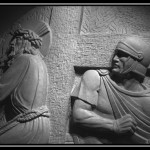We run our website the way we wished the whole internet worked: we provide high quality original content with no ads. We are funded solely by your direct support. Please consider supporting this project.

Was Jesus Unloving Towards the Pharisees?
Some claim that Jesus spoke to religious leaders in ways that did not reflect the love of the cross. In his climatic encounter with the Pharisees in Matthew 23, Jesus’ words were undeniably harsh. He calls the Pharisees “hypocrites,” “blind guides,” “blind fools,” “snakes” and “a brood of vipers” (Mt 23:13, 15, 16,17, 19, 23, 26, 27, 29, 33). He claims that they are “full of greed and self-indulgence” (v. 25) and are “like whitewashed tombs” (v. 27), and as such, Jesus wonders how these leaders will “escape being condemned to hell” (v. 33). But does such harsh speech indicate that Jesus “does not absolutize loving one’s enemies,” as some claim?
If Jesus was simply hurling insults at these people to ridicule them, embarrass them, or to make himself look superior to them, he indeed would have been unloving. But it is totally out of character to suppose this to be Jesus’ motivation. I would suggest that it is far more plausible to understand Jesus’ extreme language to be illustrating the biblical mandate to speak “the truth in love” (Eph 4:15, cf. 25). If the Pharisees were in fact as steeped in spiritual darkness as Jesus claims, then Jesus’ offensive language can be understood as a desperate, love-motivated attempt to shock them into realizing their dire situation, not unlike a parent who screams to get their child’s attention to keep them from danger.
Nor is it difficult to understand why Jesus needed to resort to such extreme language. The sick who know they need a physician are much closer to healing than those who imagine they do not (Mk 2:17). While Jesus could interact with those who on some level were aware of their sickness in a warm and healing way – which is why the worst of sinners wanted to fellowship with him (Lk 5:30; 7:34; 15:1) – this approach had no hope of working toward those who were afflicted with the self-righteous delusion that they had no need for this physician. These “hypocrites” had already judged Jesus’ warm interactions with sinners to be a sign of moral weakness and compromise. Had Jesus adopted this approach to them, he would have been dismissed without a hearing. The only hope of possibly waking up these “blind guides” to their desperate spiritual condition was to hold a mirror up to their faces by turning the harsh judgmental language they directed toward others back on themselves. And harsh as it sounds, it was motivated by love.
At the same time, it is significant that Jesus directed this offensive language against the Pharisees in front of “crowds” (Mt 23:1), for it suggests that this language was used not only out of love for the Pharisees, but also out of love for those who had come under, or who might come under, their destructive influence. These were the common people on whose shoulders the Pharisees had placed “heavy, cumbersome loads” while being unwilling “to lift a finger to move them” (v. 4). It seems evident that Jesus’ public hypocrisy-exposing speech was motivated by a love that wanted to save these people as much as it was motivated by a desire to save the Pharisees.
Finally, the closing of Jesus’ speech reveals that, behind all the harsh rhetoric he had just used was a broken-hearted parent. For Jesus ends by crying out,
Jerusalem, Jerusalem, you who kill the prophets and stone those sent to you, how often I have longed to gather your children together, as a hen gathers her chicks under her wings, and you were not willing. Look, your house is left to you desolate (vv. 37-8).
Note that Jesus speaks the truth that Jerusalem had rejected and killed God’s messengers in the past, and just prior to this, he had grouped the Pharisees in with this murderous tradition (vss. 34-6). Yet, reflecting the heart of the Father, Jesus does not follow this declaration up by expressing rage: he follows it up with an expression of profound sorrow. His only desire has always been to gather his children and protect them, like a hen does its chicks. Yet they “were not willing.”
It is this heart that we must see behind Jesus’ harsh words to the Pharisees. And in this light it becomes clear that Jesus was not qualifying his instruction to love enemies by harshly rebuking the Pharisees: he was illustrating it. And if a further demonstration of the loving nature of this speech is necessary, consider that, as was true of his cleansing of the Temple, this confrontation with the Pharisees moved Jesus one step closer to his eventual arrest and crucifixion, where he would freely offer up his life for all sinners– including the Pharisees!
Photo credit: *n3wjack’s world in pixels via Visual Hunt / CC BY-NC-SA
Category: General
Tags: Enemy Love, Jesus, Love
Topics: Enemy-Loving Non-Violence
Related Reading

Why NO Violence in Jesus’ Name is Justified
Image by papapico via Flickr On Friday, Greg posted a response to Obama’s speech about religiously-inspired violence. Here are some further thoughts on why violence in the name of Jesus—no matter whether we call it just, redemptive, or defending ourselves—is just another form of kingdom-of-this-world living. The love we are called to trust and emulate is supremely…

What Power Do You Trust?
Governments and nations have always relied on fighting to survive. They punish criminals who threaten their welfare. They go to war against enemies who attack their borders or stand in the way of their agenda. This is how the kingdoms of the world maintain law and order and advance their causes. By contrast, the Kingdom…

The Good Samaritan, Non-Violence & Eternal Life
Renaud Camus via Compfight An expert in the law asked Jesus what he had to do “to inherit eternal life” (See the story in Luke 10:25 and following). Jesus asked him what he thought the law said about this issue. The man responded, “’Love the Lord your God with all your heart and with all…

Why a “Christocentric” View of God is Inadequate: God’s Self-Portrait, Part 5
I’m currently working through a series of blogs that will flesh out the theology of the ReKnew Manifesto, and I’m starting with our picture of God, since it is the foundation of everything else. So far I’ve established that Jesus is the one true portrait of God (See: Part 1, Part 2, Part 3, Part 4).…

On Mental Illness and Jumping from a Burning Building
seyed mostafa zamani via Compfight Ann Voskamp wrote this piece in the wake of the suicide of Rick Warren’s son. It’s disheartening to hear so many thoughtless and cruel comments by other Christians when tragedies like this strike. But here is a voice of knowing and compassion. Here is love. From Ann’s blog post: I…

Finger-Pointing and the Impulse to Judge
To no one’s surprise, yet to the sadness of many of us, several Christian spokespeople, including James Dobson, Mike Huckabee and Bryan Fischer, are blaming the shootings in Newtown, Conn, on abortion and gay marriage. This is sadly reminiscent of Jerry Falwell’s hurtful response to 9/11 when he divined that “the pagans,” “abortionists,” “feminists,” “gays,” “lesbians,”…
